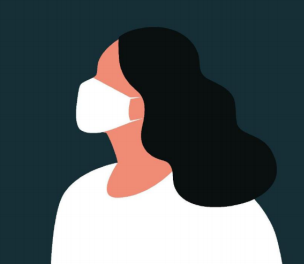* Photo: Twitter / "Manhood is deadlier than corona"
Click to read the article in Turkish
The Diyarbakır-based Socio-Political Field Research Center has released its "Research Report on the Effects of Covid-19 on Women and Violence Against Women and Children in Turkey."
The report has been prepared based on the surveys participated by 1,873 women from 28 provinces including İstanbul, Ankara, İzmir, Diyarbakır, Van and Mardin from April 3 to 8. The study aimed to find out how women were affected by the pandemic process, how many children and women were subjected to violence and to what type.
How has pandemic affected domestic life?
The participants of the survey were first asked, "Is there anyone in your household who has lost his or her job during the pandemic?". While 59.3 percent said "No", 40.7 percent answered in the affirmative. While the rate of those who said "Yes" was the lowest among university graduates, it was the highest among illiterate participants with 88.9 percent.
When they were asked "whether family members, including men, shared housework during the quarantine," 34.8 percent of the participants said "Yes" while 33.1 percent answered "Partly" and 32.1 percent "No". The research has shown that the higher the educational level and income got, the higher the rate of participants who answered in the affirmative became.
Participants of the survey were also asked "whether they had any domestic disputes or conflicts during the quarantine," 69.4 percent said "Yes" while the remaining 30.6 percent answered in the negative. Similar to the above picture, the higher the educational level and monthly household income got, the less people answered with "Yes".
The ones who said that "they had domestic disputes or conflicts during the quarantine" were also asked "whether the domestic disputes were more intense before or during the quarantine." While 52.6 percent of them answered that "it was the same in both periods," 39.5 percent said that "it was more intense now" and 7.9 percent said "it was more intense before."
To the question "with which family members they had a dispute most," 32.4 percent said "spouse", 16.3 percent "siblings", 15.7 percent "son/daughter" and 13.2 percent did not give an answer.
In response to a question on the most frequent issues of dispute, 14.6 percent said "cleaning", 10.6 percent said "material needs/money", 8.8 percent "personal whims", 7.6 percent "domestic interventions" and "7.2 percent said "housework/meal".
CLICK - Women's Organizations Call for Urgent Action Plan to Prevent Male Violence During Pandemic
Violence against children and women
The participants of the study were also asked "How is quarantine period affecting your state of mind?". While 38.3 percent said "negatively", 26 percent said "very negatively" and 2.5 percent said "positively".
To a question on "whether the quarantine period triggers violence against women and children," 45.9 percent of the participants answered in the affirmative while 39 percent said "Partly" and 17.2 percent said "No".
When the women were asked "In the course of quarantine period, which of the following were you subjected to?", 23.7 percent said that they were subjected to psychological violence, 10.3 percent to economic violence, 4.8 percent to digital violence, 1.7 percent to physical violence, 1.4 percent to sexual violence and 1.1 percent to stalking. 57 percent said that they were not subjected to any of these forms of violence.
Women were also asked "Were you subjected to violence inside the home during the quarantine?". While 84.8 percent said "No", 15.2 percent answered in the affirmative.
However, in the previous question, 57 percent said that they were not subjected to any violence during the quarantine. To put it in other words, the survey results have shown that violence against women has increased by 27.8 percent during the pandemic.
Moreover, it was seen that while the rate of those previously subjected to violence drops depending on the age, the ones aged 65 and over are the ones previously subjected to violence the most as an exception.
What to do against violence
To the question "What precautions do you think should be taken to prevent domestic violence during the quarantine?", the participants gave the below multiple answers:
- Support groups should be established for women/ the condition of women should be monitored (15.3 percent)
- The Law 6284 on the Protection of Family and Prevention of Violence Against Women Should be implemented effectively (13.7 percent)
- The mechanisms of complaint and application must be digitalized to ensure easy access (12.3 percent)
- Informative/warning publications/broadcasts on domestic violence and sexism should be made on digital platforms or TVs about (11.9 percent)
- Legal/psychological support should be provided online/on the Internet (11.9 percent)
- The reports/tips of third parties should be taken into consideration (11.9 percent)
- Shelters should have the necessary conditions for protection from coronavirus (11.8 percent)
- Public service ads should be made (11.2 percent)
- Socio-economic regulations/arrangements should be introduced (0.1 percent)
While the awareness of the Law no. 6284 was high in all age groups, the rate of awareness was highest among the 45-54 age group with 81.8 percent. The higher the educational level and monthly household income got, the higher the awareness of the participants became.
Lastly, when women were asked "whether they knew about the emergency and tip lines in the event violence against women," 68.1 percent answered in the affirmative while 31.9 percent said "No". While this rate was high in all age groups, it was the highest in 45-54 age group with 72.4 percent. The report has also concluded that apart from some exceptions, the higher the education level and monthly household income, the higher the awareness of the participants. (RT/SD)




















